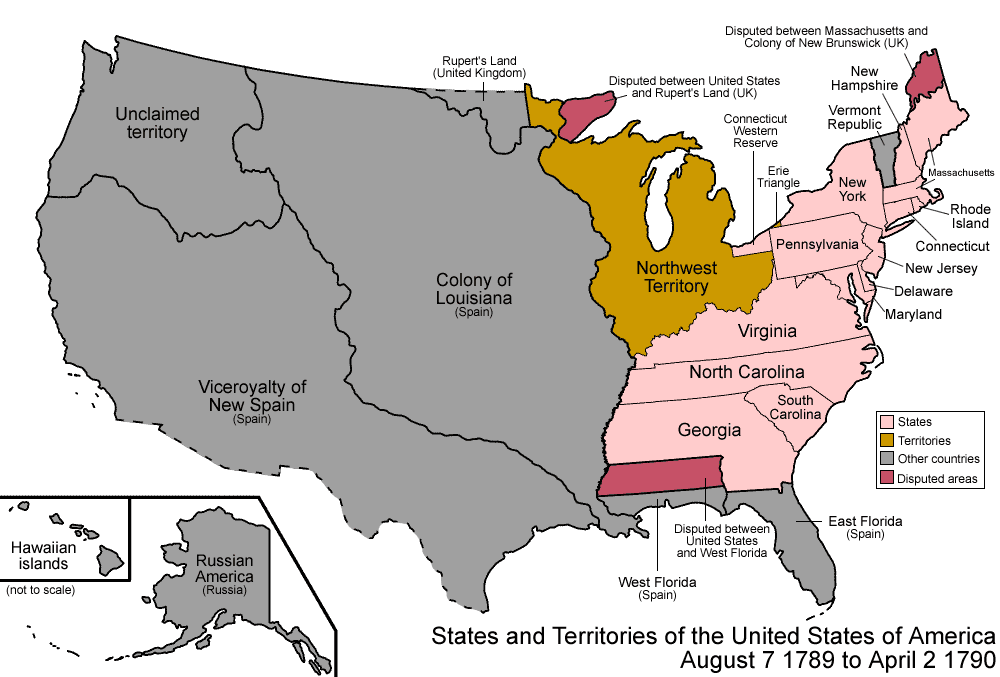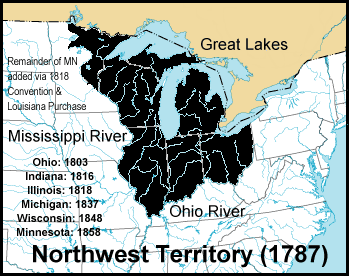
How the Northwest Ordinance Promoted a Just Society
“The great title deeds”
In an illuminating interview on the Northwest Ordinance, Hillsdale College President Larry P. Arnn explains one of America’s key founding documents. This is not a usual subject here. Indeed Churchill’s History of the English-Speaking Peoples doesn’t even mention it. Nonetheless— the Northwest Ordinance of 1787 qualifies as one of Churchill’s “great title-deeds of Anglo-American liberties.”
.
The interview didn’t answer all my questions but taught me things I didn’t know. I doubt that many American schoolchildren know them either. Nevertheless, the Northwest Ordinance deserves broader familiarity.
Northwest Ordinance Provisions
Dr. Arnn’s remarks need little elaboration here. But among the points he emphasizes are these.
.
1) There were actually two vast land acts, the other 1785.
.
2) That both acts passed under the Articles of Confederation. The Northwest Ordinance passed in New York in July 1787, while the Constitution was being debated in Philadelphia. This contradicts my schoolboy impressions that nothing of importance happened between the end of the American Revolution (1783) and adoption of the Constitution.
.
3) On acts of national import, the Articles of Confederation required unanimity, including the South. This was why, in many cases, they were inadequate for dealing with matters applying to the states as a whole.
.
4) That the acts were necessary to pay for the Revolutionary War. The Articles of Confederation did not convey the right to levy nationwide taxation, and the Congress that had fought the war was deeply in debt.
.
5) The Northwest Ordinance created the townships that are still basic components of American local government today. They were formed in the shape of blocks for ease of assignment, retaining one space in the middle of each. Its purpose was not government, as you might expect. It was education, which the founders considered the most essential of public services.
.
6) Such concepts marked marked a dramatic departure from European and feudal norms. In England, for example, generations farmed or worked on land belonging to others. Now, the Ordinance was saying, that any American citizen could buy and own his own land.
Against Slavery
7) The Northwest Ordinance banned slavery throughout the new territory. This effectively made the United States two-thirds slave-free, over three decades before the British Empire banned the slave trade.
.

8) Moreover, and astonishingly the territory governed by the Northwest Ordinance was ceded largely by Virginia, the leading slaveholding state. Yet the Ordinance assured the creation of states in all respects equal to the original 13.
.
9) And those states—Ohio, Indiana, Illinois, Michigan, Wisconsin and Minnesota—would in time provide the surfeit of troops who would win the Civil War, preserving the union and ending slavery where it still existed.
No nation on the planet…
…had ever before declared such precepts: that all are equal, entitled to natural rights and rule of law, however imperfectly it served those truths in the beginning. Here Dr. Arnn’s point is powerful. Much of the “title-deeds” were written by Thomas Jefferson, so often portrayed as a hypocrite slave owner. Yet Jefferson never spoke about slavery except to condemn it. We can argue that he insufficiently opposed it, Dr. Arnn says. But then we have to consider what was possible in the state of things. However, no one can argue that he saw it as anything but a moral wrong that had to go.
.
Years before the Revolution, Benjamin Franklin was living mainly in London, where he represented the interests of several colonies including Georgia, Massachusetts and New Jersey. On several occasions, Dr. Arnn notes, Franklin had tried to explain the new ideas about natural rights flourishing in the American colonies, all the while insisting that they remained loyal to the Crown. The English ridiculed him and shouted him down. Eventually Franklin reported home to brace for war. In France, where similar ideas were percolating, Franklin found broader welcome, although those ideas wouldn’t work out quite as neatly there as they would in North America.







One thought on “How the Northwest Ordinance Promoted a Just Society”
George Lincoln Rockwell cited the Churchill speech in a 1967 lecture at Michigan state university. He would claim he was not Anti-Semitic, just opposed to Communism and the Jews who supported it. Inspite of his controversial remarks he was politely received and was himself respectful in his demeanor and delivery of his speech. Given the hypersensitivity of today’s climate, I doubt a man of Rockwell’s cloth would be well received at any of our centers of higher learning. When he spoke at a New York college in 1964, many of the students respected his right to speak and were supportive of the idea of intellectual freedom. As Oliver Wendell Holmes once wrote , “If there is one star in our constitutional constellation we must respect above all else,it is freedom of thought, not free thought that we agree with but freedom of the thought that we hate”(U.S. vs. Schwimmer, 1929).
Comments are closed.